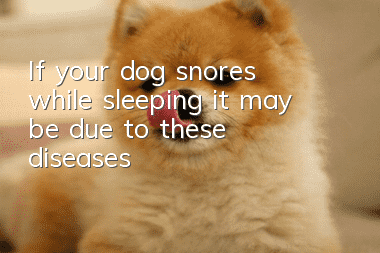If your dog snores while sleeping, it may be due to these diseases!

Sometimes when the shit shovel officer is concentrating on his work, he may hear a snoring sound. When I turned around, I saw that the dog was asleep. Does a dog's snoring mean that it is sleeping deeply? In fact, dog snoring is not necessarily a good thing. It may be caused by obesity, disease, improper sleeping posture or air pollution. Some dog breeds can also cause snoring due to their special body structure.
Causes of snoring in dogs
The main reason why dogs snore is that the upper respiratory tract is narrowed due to some kind of influence. When air passes through the contracted upper respiratory tract, the surrounding mucosa will vibrate, thus producing sound, which is snoring. 1 Foreign body. Foreign objects in the dog's nose or throat may prevent the dog from breathing normally, and symptoms such as sneezing, runny nose, snoring, and nosebleeds may suddenly occur. 2. Dog breed. Certain breeds of dogs are more prone to snoring due to their anatomy. Examples include short-nosed pugs, bulldogs, and Boston dogs. Because their soft palate is longer than that of normal dogs, it can easily block the airway and hinder breathing. Therefore, a soft palate that is too long will move with breathing and cause snoring.
In addition to sleeping, they usually breathe like snoring. Due to congenital defects, they are prone to cyanosis and breathing difficulties with even the slightest movement, which can sometimes be life-threatening. The ultimate treatment is surgical removal of the soft palate. In addition, obesity can also cause the soft palate to droop, so don’t let your dog eat too much.
3. Obesity. The Association for Pet Obesity Prevention (APOP) estimates that more than half of dogs are overweight or obese. Obesity can cause upper respiratory tract obstruction in dogs. Because the thick fat around the neck can compress the upper respiratory tract, causing dogs to snore.
4. Dental problems. Gum abscesses or lumps in the mouth and nose may be the root cause of snoring. If left untreated, the virus can spread throughout your dog's body and cause more serious disease problems. 5. Air pollution. Secondhand smoke can damage an animal's respiratory system, causing asthma, bronchitis and snoring. When a dog inhales "second-hand smoke", the mucous membrane of the nose is irritated and the nose will be prone to runny nose. And nasal discharge can cause nasal congestion, so it is easy to snore when sleeping. In addition, some dogs that are allergic to dust, pollen or perfume may have their airways constricted and snore after inhaling these substances.
6. Disease. Snoring can be caused by a fungal disease called aspergillosis. The disease is caused by mold and is usually picked up from grass clippings, hay, straw or dust. Fungus can enter through the moist lining of the nose, causing symptoms such as sneezing, swelling, runny nose, and snoring. In addition, rhinitis can also cause a blocked nose. Your dog's mucus membranes can become inflamed due to infection, fungus, trauma, or other causes, which can cause your dog to have a runny nose and sneezing.Sneezing, snoring and difficulty breathing. In addition, heart disease may also cause snoring in dogs. When the heart suffers from "mitral regurgitation," the mitral valve cannot function smoothly, causing blood to flow backward from the left ventricle to the left atrium, preventing blood from being transported smoothly throughout the body. When blood flows backward causing congestion in the left atrium, the left atrium becomes enlarged and the bronchial tubes are compressed, causing coughing and snoring.
7. Sleeping position. Your dog's sleeping position may also contribute to his snoring. Dogs who sleep on their backs are more likely to snore than dogs who sleep curled up or on their stomachs.
Methods to relieve dog snoring
1. The lack of natural lubricants in air humidifiers can make snoring puppies have dry mouths. When these throat flaps touch and stick together, snoring can worsen. Therefore, owners can use an air humidifier to increase the indoor air humidity and make the dog feel more comfortable while sleeping.
2. Prepare a round dog bed. Change your dog to a round dog bed, which can encourage your dog to sleep in a curled-up sleeping position. This opens their air passages and relieves pressure on the esophagus. 3. Weight loss As mentioned above, obese dogs may also cause the thick fat to compress the upper respiratory tract, causing difficulty breathing and snoring. For the sake of the dog's health, the owner finally helps the dog lose weight.
4. Surgery If the dog has a long soft palate, in order to prevent the complications of other diseases such as tracheal collapse, it is best to perform surgery to remove the soft palate as soon as possible.
If you find your dog snoring, don’t be too noisy! It may be snoring to tell you that something is wrong with its body~
- Have you ever done five behaviors that make your dog sad?
- The correct steps to bathe your dog
- How to train a dog to stand? As long as the method is right, anyone can teach it!
- Precautions for dogs taking painkillers
- What’s wrong with a dog’s nose being hot?
- Tips for raising Husky puppies
- Four principles for choosing a dog breed
- Symptoms and Treatment of Nutritional Anemia in Dogs
- How to get your Shiba Inu dog used to brushing his teeth?
- How to stop a dog who likes to attack people? If he doesn’t change his behavior, he will be in trouble when he grows up!



